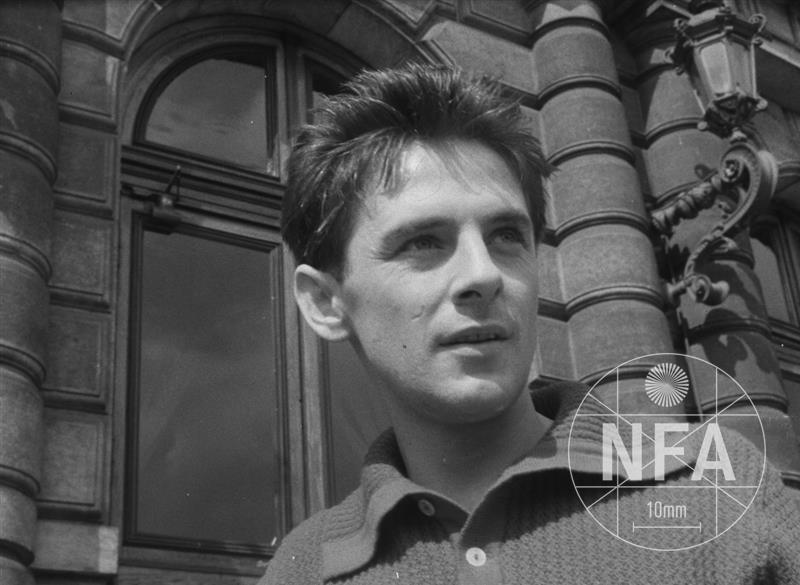A Workday Which Is a Sunday
Country
Czechoslovakia, HungaryCopyright
1962Production year
1962Premiere
21 December 1962Runtime
86 minDirector
Félix MáriássyCategory
filmGenre
music, comedyTypology
featuretheatrical distributionlongOriginal title
Neděle ve všední denCzech title
Neděle ve všední denEnglish title
A Workday Which Is a SundayCo-production title
Pirosbetüs hétköznapokSynopsis
Baritone singer Valenta selects a young piano player, Jana Landová, to accompany him at two concerts in Hungary. In Budapest, they are both taken care of by an employee of the concert agency, Klári Kelemen. At one party, Valenta performs several songs and Jana then gives a solo performance of a piece by Janáček. Her success greatly displeases the Hungarian piano player Szalóky, whose fall on the staircase upon leaving results in a painful injury. At the concert, his solo is thus taken by Jana. The next day, both Czech artists are to perform in Eger. Klári goes with Valenta and Jana is driven there by Klári's husband. Klári organizes a farewell party in her apartment. During the last toast, she invites Jana to stay with them for several more days, and Jana accepts the invitation. But Klári has her duties and Jana is thus attended by Klári's husband one night. The spontaneous and charming Jana enchants Kelemen and he kisses her in the elevator. They both, however, immediately realize that they cannot go on like this. Jana returns to Prague the next day, awaited by her husband and a child and by a "normal" day filled up with interesting work.
Cast
Jana Brejchová
klavíristka Jana Landová
Éva Ruttkai
Klári Kelemenová, pracovnice koncertní agentury
Jaroslav Marvan
operní pěvec Jaroslav Valenta
Miklós Gábor
MUDr. Kelemen, Klářin muž
Ivan Mistrík
skladatel Jiří Landa, Janin muž
Elma Bulla
operní pěvkyně Ella Szemethyová
Vlasta Matulová
Bartušková, Janina matka
Jiřina Bohdalová
Anička
Hana Hegerová
choreografka Lída Hálková
Endre Csonka
číšník
László Márkus
Szalóky
Pavel Pekárek
houslista
Hana Talpová
dívka na svatbě
Ladislav Fialka
pantomima
Zdeňka Kratochvílová
pantomima
Ludmila Kovářová
pantomima
Ivan Lukeš
pantomima
Richard Weber
pantomima
Jiří Kaftan
pantomima
Jana Pešková
pantomima
Elena Hálková
sousedka
Václav Švec
listonoš
Valentin Knor
zvukový mistr v nahrávacím studiu
Ota Žebrák
prodavač
Václav Vorlíček
muž ve vinárně ve světlém saku
FISYO
symfonický orchestr
Josef Burda
dirigent
István Avar
Géza Berczy
Tamás Berg
Gábor Csíkos
Andor Dárday
Franciska Györy
Sándor Járóka
Ervin Kibédi
Vilma Madaras
Vilmos Mendelényi
Erzsi Pártos
Irén Sitkey
Imre Surányi
András Tassy
József S. Tóth
Elemér Tarsoly
Crew and creators
Director
Second Unit Director
Dezsö Koza, Václav Vorlíček
Assistant Director
Zdena Pavlátová, Pál Gábor, Juraj Kerekes
Screenstory
Screenplay
Shooting Script
Dramaturg
Director of Photography
Second Unit Photography
Tibor Vagyóczky
Camera Operator
Béla Langmár
Production Designer
Assistent Production Designer
Set Designer
József Bauer, Karel Kočí, Jaroslava Vilímková
Costume Designer
Costumes
Make-Up Artist
Film Editor
Sound Designer
Karel Jakl, Bohumír Brunclík (zvukové efekty)
Production Manager
Unit Production Manager
Karel Fiala, György Schiller, Věra Winkelhöferová
Unit Production Manager
Jordan Balurov, János Krasznai
Cooperation
Jaroslava Radová (klapka)
Music
Music Composed by
Selected Music
Music Performed by
FISYO (Music Conducted by František Belfín), Eva Bernáthová /klavírní sólo/, Zdeněk Jílek /klavírní doprovod pantomimy/
Songs
Synáčku, můj květe – ukolébavka z opery Jakobín
Song Composer Antonín Dvořák
Writer of Lyrics Marie Červinková-Riegrová
Singer Jaroslav Marvan [dab]Václav Bednář
Když mne stará matka – píseň z cyklu Cigánské melodie
Song Composer Antonín Dvořák
Writer of Lyrics Adolf Heyduk
Singer Elma Bulla [dab]Judit Sándor
Jakobín
Cikánské melodie
Production info
Original Title
Neděle ve všední den
Czech Title
Neděle ve všední den
English Title
A Workday Which Is a Sunday
Co-production Title
Pirosbetüs hétköznapok
Category
film
Typology
featuretheatrical distribution
Genre
music, comedy
Origin country
Czechoslovakia, Hungary
Copyright
1962
Production Year
1962
Production specifications
literary Screenplay approved 24 January 1962
technical Screenplay approved 19 February 1962
start of filming 19 April 1962
end of filming 20 July 1962
projection approval 26 September 1962
withdrawal from distribution 30 June 1971
Premiere
premiere 21 December 1962 /suitable for youths/ (celostátní)
preview 21 December 1962 (kino Sevastopol /1 týden/, Praha)
premiere 28 December 1962 /suitable for youths/ (kino Jalta /4 týdny/, Praha)
Copyright Holders
Studio
Distribution
Creative Group
Tvůrčí skupina Šebor – Bor, Vladimír Bor (vedoucí dramaturg tvůrčí skupiny), Jiří Šebor (vedoucí výroby tvůrčí skupiny)
Technical info
Duration typology
feature film
Duration in minutes
86 min
Original length in metres
2 458 meters
Distribution carrier
16mm, 35mm
Aspect ratio
1:1,37
Colour
black & white
Sound
sound
Sound system/format
mono
Versions
Czech
Dialogue languages
Czech
Subtitles languages
without subtitles
Opening/End credits languages
Czech







